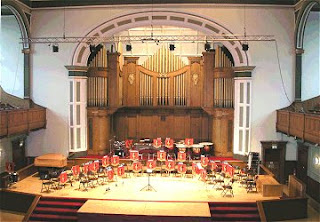Tickets sales and classical music

Money may be the root of all evil, but without it putting on a classical music concert is nearly impossible. Getting money for one concert is tough, but when looking at the long range picture (future concerts) it's important to know how to leverage a current event to the greatest advantage.
Publicity for a classical music event is primarily an attempt to get tickets sold, people through the door of a concert. And in some respects the publicity campaign we've been running is working. I was stopped on the street the other day because someone recognised my face from the poster; they mentioned how excited they were and looking forward to the concert (posters working, check). A lecturer at Edinburgh University mentioned to his students about the concert fliers encouraging them to all attend (fliers working, check). One of the many publication we sent press releases to actually came back with notification they would be printing an article this week (press releases working, check).
However, publicity is not just to get bums on seats. There is a certain number of people we'd like to know about the event so future events are possible. This comes down to the whole process of money in terms of classical music. If we were relying on ticket sales to pay for the cost of the event, we'd be in a world of hurt. While it is possible we might break even (and that's a pretty big might), this is mostly due to corporate sponsorship. But in order to get future sponsorship, we need the current event to get the right kind of publicity, the right kind of people to hear about it (and potentially attend).
In order to do this, we first needed to sort out who it is we thought might be the right kind of people. Our list included the Artistic Directors, or Chief Executives from all the major music organisations in the area. So, for Edinburgh this includes, the Edinburgh Festival, the Royal Scottish National Orchestra, the Scottish Chamber Orchestra and Scottish Opera (to start). Politically connected people, like the First Minister of Scotland, the Lord Provost, and the Cultural Minister for Scotland were on our list. The other organisations that deal with funding in terms of music like the Scottish Arts Council and the heads of the universities. Then there are the reviewers and agents who might get us more publicity, or future work. All these ended up making a list of over a hundred people who were mailed an invitation to our event. Some, a very few, were offered complimentary tickets, but most were just given a personal invitation. How many of these people actually show up? It's hard to know at this point, but marketing studies suggest 10% is a good mark.
There are also "friends" lists from the music organisations we're working with on this concert. The Edinburgh Quartet, the Edinburgh Symphony Orchestra and Central Hall all have lists of people who want updates to their schedules. Asking permission to send invitations to these people can add another couple hundred letters.
In the end, we hope to fill the house, that's 500 seats. Ticket prices were set at a level that is moderate in terms of the amount of music presented and the level of performers. Again, we may or may not break even, but a higher ticket price wouldn't necessarily change that. Since I am an unknown composer (at present, hoping the concert will change that to some degree), we couldn't justify a higher price. However, in the same instance, we didn't want to price the concert too low, as we are providing two hours of original classcial music performed by some of the best Edinburgh has to offer.
If we can fill (or nearly fill) the house and get 10% or more of the "powers that be" from the classical music industry to our concert, we are confident the music will speak for itself. The music will get the right people interested in hearing more, which means opportunities for future money (ie, future events). In the end run, the 'right kind' of audience member is anyone that is interested in the performance, the music and/or the composer! We have no idea at this point whether we are close to selling out or not because advanced ticket sales are not common for one off performances; most people just pay at the door. So, on the night of 4 June, we may be playing to a packed house and a bright future - or we may be performing for a few close friends and then its back to the drawing board for how to do better next time.We're still two weeks out.... so if you have any ideas how to get more of the right kind of people to this concert, feel free to comment!

Comments
I'll tell you what we did here in Columbus, which worked great: we had a party at a local lounge after the concert. We called it an "After-Concert Meet-and-Greet." This allowed the students and public to interface with the musicians. After many people had met the musicians, they were entirely committed to coming back and seeing them again. The personal touch goes a long way as to making long-term friends of the orchestra!
Just a thought.
If you have more questions, email me and I'll send you some of our brochures, etc.!
We are having a catered intermission - more than just tea and store bought cookie. Although, the posters say nothing about that so I'm not sure anyone will attend just for the buffet...
I do like the idea of an after concert something. Maybe next time.